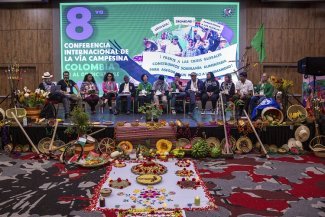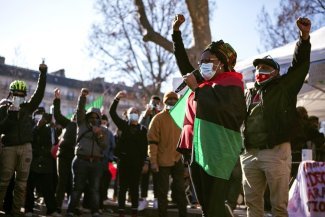Former employees from the Bravo Tekstil factory meeting in a café in the Merter neighbourhood of Istanbul to decide on the next steps to take, 14 November 2017.
Since the summer of 2016, the meetings at the Disk Tekstil union head office in Merter, a working class neighbourhood of Istanbul, have become regular.
Filiz Tutya is sat in the president’s office. The 50-something-year-old worked at the Bravo Tekstil factory from the moment it opened, six years ago. Seventy per cent of the articles she made were for the Spanish retailer Zara, owned by the Inditex group. Everything was going fine, until 25 July 2016.
“The day before, a group of men came into the factory. Our boss owed them money. We thought the problem was going to be sorted out, but when we came to work the next day, the building was empty and our boss had fled,” she recalls.
On fleeing, the boss left 140 employees on the street.
“There were some financial problems,” admits Azem Atmaca. This forthright machine operator had been working at the factory for four years. He has never experienced anything like it, although he has been working since the 1970s. “During the final months we were paid late, or only half. But we really thought the company would find a solution.”
A year and a half after the factory’s sudden closure, the 140 workers are still waiting for their last three months’ pay. According to the union, the Spanish retailer should pay out over three million lire in total (over US$750,000).
They have tried to demonstrate in front of the building, but they are no longer welcome. “There is no sign of life at the factory, the signs have been taken down and we were met by the police when we went back to the premises,” explains a former employee.
They marched to the head office of the Inditex group, and then demonstrated in front of the Spanish Consulate, to no avail.
Financial difficulties have added to the blow. Azem’s torrent of words speeds up as his anger mounts. His face reddens. He confides: “I took out two loans for the sum of 25,000 lire (US$6,000). I can’t pay them back.” These financial difficulties are unbearable for this grandfather. “I cross to the other side of the street when I see my grandchildren coming, because I don’t even have enough money anymore to buy them sweets.”
Filiz, for her part, had managed to find work for a month or two, but on 8 March of this year she found out she was seriously ill. “I have breast cancer.” She is reserved, does not want to talk at any more length about her illness, and prefers to put her other colleagues first, “those who have children to look after or loans to pay”.
What Filiz does not say can be read between the lines: the fatigue, the difficulty paying for healthcare now that she is out of work.
“We worked hard, we made over a million products. They have all been sold, despite the problem at the factory. So why haven’t we been paid?” rails Azem.
The workers’ legitimate question has been met with nothing but unsatisfactory proposals. “We have rejected them all,” explains Asalettin Aslanoğlu, the president of the trade union Disk Tekstil. The workers contacted him to deal with the case. It is a problem he is familiar with, as he had already been in touch with Inditex a few years prior regarding unpaid wages.
“One of the offers made was to pay a quarter of the amount claimed, to be distributed among the blue collar workers alone. But we are fighting for all the employees, without exception, the blue collar workers, the white collar workers, the secretaries and the drivers,” protests the president.
The case is now in the hands of the courts. Action has been filed, but the workers and their union have not yet lost hope of meeting with directors from Zara to resolve the situation.
“No agreement despite the international framework agreement”
The textile sector occupies an important place in the Turkish economy. Turkey is the world’s fifth-largest exporter of textile products and seventh largest clothing exporter.
According to the Turkish Textile and Apparel Exporters’ Association, İTKİB, 70 per cent of the textiles exported during the first half of the year were for the European Union and amounted to 8 billion dollars.
The Turkish government, moreover, is aiming to reach 80 billion dollars in textile exports for the centenary of its Republic in 2023.
“According to the statistics, a million workers are employed in the textile sector,” says Aslanoğlu, “But the figures do not take into account the informal sector, although it occupies a large place. At least 500,000 workers should be added.”
The Turkish market attracts international groups thanks to the quality of its labour force and its competitive prices. “The level of demand is such that orders have to be subcontracted out, and that’s where the biggest abuses take place,” he continues.
This was one of the reasons behind the international framework agreement signed by IndustriALL Global Union and the Inditex group in 2007. The text not only establishes the right to freedom of association but also protection and respect for fundamental rights throughout the supply chain.
Inditex did not respond to Equal Times’ request for an interview. It has, however, responded through the press with the following statement: “Inditex has met all of its contractual obligations to Bravo Tekstil. The owner of the factory suddenly disappeared leaving his employees on the street. Inditex is currently working on a proposal with the local IndustriALL affiliate, Mango, and Next to establish a hardship fund for the workers affected by the fraudulent disappearance of the Bravo factory’s owner. The global union federation is currently negotiating with its local organisation in Turkey in a bid to reach an agreement.”
This hardship fund would cover the unpaid wages, compensation, unused holidays and the severance pay owed to the workers that were employed when the factory suddenly shutdown in July 2016. The president of the textile union, however, ensures us that he has no knowledge of a hardship fund being set up.
“Tell Zara to pay us”
The question all the workers are asking themselves is what weight do they carry compared with a global group like Inditex? Almost 18 months on, tired of waiting, they are now organising in committees, on their own level. Assisted by the trade union, they turned to the non-governmental organisation Clean Clothes Campaign.
Following its valuable advice, they engaged in a campaign that managed to cause a big stir.
“We split up into small groups and placed messages in Zara’s clothes to raise awareness among its customers,” explains Filiz. “They immediately took photos and shared them on social media. The very same day, it became a phenomenon on Internet,” she recalls, still astonished. Now she always keeps a few of them in her bag.
The message was concise but effective: “I made this article you are about to buy and I have not been paid for it […] Please, tell Zara to pay us.”
For Abdurahim Demir, a representative of the NGO, it’s not about damaging the brand but about raising awareness: “Public pressure needs to be put on the big brands. We hope that by doing so, they will finally agree to pay the employees, or at least to meet them.”
Pending the next initiative, there is still an online petition, which, with 290,000 signatures, is close to reaching its target of 300,000.










